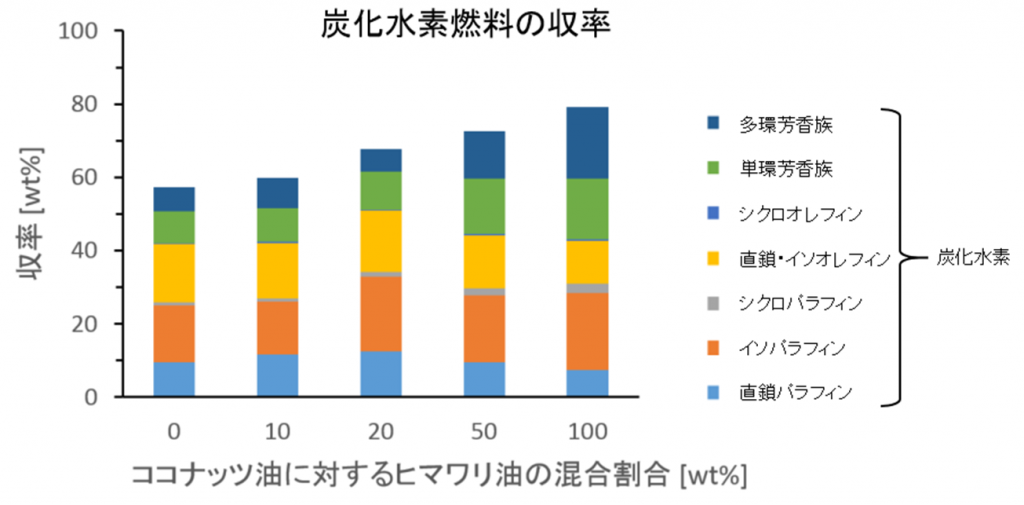Press Releases
* Please note that the news release contains the content at the time of the announcement and may differ from the latest information.
Confirmed research results that can efficiently produce hydrocarbon fuels from plant-derived oils
Euglena Co., Ltd.
Euglena Co., Ltd. (Headquarters: Minato-ku, Tokyo, President: Mitsuru Izumo) confirmed the research results that can efficiently produce hydrocarbon fuel from plant-derived oil in joint research with Shinshu University. We are pleased to inform you that we made a presentation at the 81st Annual Meeting of the Chemical Engineering Society held on March 14th (Monday). In addition, we filed a patent application for the results of the announcement on November 4, 2015.
Generally, fuels consisting of carbon and hydrogen, such as petroleum products, are called hydrocarbon fuels, but plant-derived oils contain oxygen molecules and cannot be used as hydrocarbon fuels. Therefore, when extracting hydrocarbon fuel from plant-derived oil, hydrogenation treatment is required to remove oxygen molecules, which increases the cost of capital investment.
In this study, as a method of producing hydrocarbon fuel from plant-derived oil without hydrogenation, coconut oil containing saturated fatty acid * 1 as the main component and sunflower oil containing unsaturated fatty acid * 2 as the main component were used. Then, we conducted a study using a catalytic cracking reaction that causes a cracking reaction with a catalyst to extract hydrocarbon fuel. As a result, it was confirmed that the yield of hydrocarbon fuel increased in sunflower oil and oil in which coconut oil and sunflower oil were mixed. As a result, unsaturated fatty acids are likely to produce hydrocarbon fuels by catalytic cracking, and saturated fatty acids are difficult to produce hydrocarbon fuels by catalytic cracking, but mixing unsaturated fatty acids increases the yield of hydrocarbon fuels. It turned out to promote.
* 1 Fatty acid whose carbon chain is saturated with hydrogen * 2 Fatty acid with a double bond
In the future, we will continue to carry out joint research to produce oils derived from vegetable oils and microalgae, which will enable the production of hydrocarbon fuels even in areas where the infrastructure that cannot receive hydrogen supply is limited. Aim for the development of.
The details of the research results are as follows.
About research contents and results using catalytic cracking reaction

■ Research content
The yield of hydrocarbon fuel was confirmed by using a catalytic decomposition reaction with each of coconut oil and sunflower oil and oil mixed with coconut oil and sunflower oil.
■ Results
We confirmed an increase in the yield of hydrocarbon fuels in sunflower oil and oil mixed with coconut oil and sunflower oil. From this result, it was found that vegetable oils containing unsaturated fatty acids such as sunflower oil are likely to produce hydrocarbon fuels when cracked by catalytic cracking. In addition, it was found that vegetable oils containing saturated fatty acids as the main component, such as coconut oil, do not easily produce hydrocarbon fuels by catalytic cracking, but mixing unsaturated fatty acids promotes an increase in the yield of hydrocarbon fuels. I did.
-Contact for inquiries from the press-
Euglena Co., Ltd. Public Relations and IR Division
